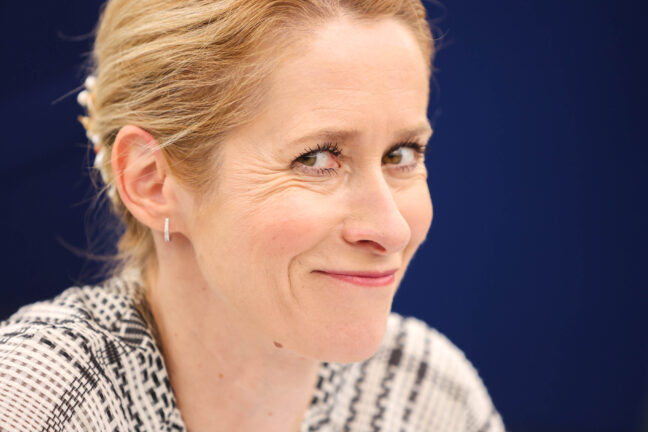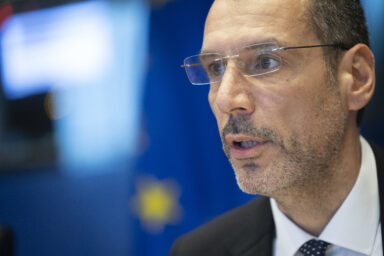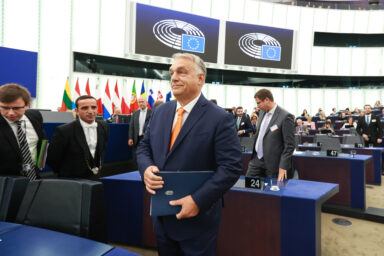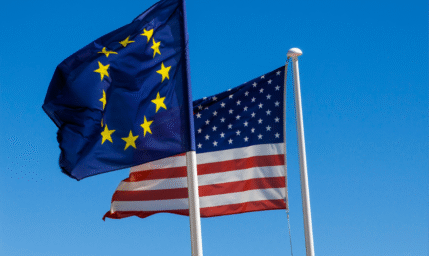European foreign ministers convened on 23 June to deliberate on interconnected global crises. At the end of the day, they had precious little of substance to say.
Kaja Kallas, the EU’s chief diplomat, chaired Monday‘s meeting of the Foreign Affairs Council, and bore the brunt of journalists‘ questioning right afterwards. Highlighting the volatile situation in Iran, she acknowledged the escalating tensions. “The threat posed by Iran has lingered for decades, and the EU has consistently maintained that it must be prevented from acquiring nuclear weapons,“ she said.
In denial
This statement, alas, was as incisive as European diplomacy got on Monday. The development around Iran laid bare how little weight Brussels carries in today’s rough-and-tumble global game of strongman geopolitics.
Ms Kallas emphasised the urgency of minimising the risks of further escalation in the US-Israel-Iran conflict, and pressed for diplomacy as the only avenue leading to a viable solution. She would argue that military actions introduce considerable unpredictability. Therefore, she asserted, it is essential for all parties to engage in diplomatic dialogue.
It was the same position the EU held last week in the hope of averting open military confrontation. As we would learn in the wee hours of Sunday, it did not work: Washington decided to strike Iran’s nuclear sites with 14 bunker-busting missiles. With their room for manoeuvre severely restricted, however, European officials on Monday still urged for a cooling of hostilities and a return to negotiations. António Costa, EU Council President, urged everybody to refrain from violence.
You might be interested
Sanctions work. Maybe
At a press conference after the Foreign Affairs Council meeting, Ms Kallas fielded questions ranging from the controversial oil price cap to the future of the Union’s association agreement with Israel and the treatment of Georgia’s opposition leaders at the hands of the country‘s pro-Russian government. “This goes to show how interconnected our security theatres are,“ Ms Kallas sighed at one point.
Apart from the interconnectedness, the ministerial meeting did not produce much on the most pressing issue of the day. The repercussions of the Middle Eastern conflict extend to oil pricing and shipping routes, particularly the strategically significant Strait of Hormuz. Discussions about the sanctions revealed that member states were hesitant to move forward without a clear mandate from the G7. Concerns about rising oil prices—boosting Russia’s potential to fund its military actions—were paramount.
Would Europe persist with its proposal to enact the latest sanctions package against Russia despite the lack of unanimous support? Maybe, not really, we will see. Why have such sanctions been so ineffective? Well, every sanctions package has its critics, Ms Kallas said.
‘We did all we could‘
She also defended the effectiveness of previous sanctions, citing tangible impacts, such as the reduction in oil revenue for Russia. The 17th sanctions package, she claimed, succeeded in curtailing oil price revenues through transporting channels. Although there was disappointment regarding the perceived strength of the sanctions, the EU’s leadership was resolute in its approach. They recognised the evolving nature of the geopolitical situation and maintained that every sanction aimed to exert pressure on Russia, even if the results were not as dramatic as initially expected.
The European Union did all it could do. – Radek Sikorski, Polish foreign minister
“Iran is opening up to talks,“ the High Representative for Foreign Affairs and Security Policy said somewhat hopefully. That was short before Qatar intercepted several Iranian missiles fired on the local US military base (Tehran also targeted a base in Iraq).
Even Radek Sikorski, the Polish foreign minister known for not mincing his words, had little to offer. “I would like to thank European negotiators. We know that the European Union did all (in the Geneva talks with Iranians last week) it could do,“ the heavyweight of European diplomacy told the Polish media on the sidelines of the meeting.
Cracks and divisions
Elsewhere, it was worse. Ursula von der Leyen, President of the European Commission, said after the US attacks that “respect for international law is critical. The leaders agreed that now was the moment for Iran to engage in a credible diplomatic solution, as the negotiating table is the only place to end this crisis.“
Paula Pinho, the Commission spokesperson, later ducked the question how the US attack on Iran’s nuclear sites demonstrates respect to international law, and what precisely a credible diplomatic solution looks like. That’s a question for the Foreign Affairs Council. What is the plan for the possible closure of the Strait of Hormuz? “There is no closure of the Strait of Hormuz,“ the spokesperson replied to a question not asked.
Any semblance of European unity on the Iran crisis was difficult to detect. French foreign minister Jean-Noël Barrot said that “there is no lasting solution to the issue by military means; only negotiation will allow a rigorous and lasting framework for Iran’s nuclear program and provide lasting answers to these questions.”
At about the same time, German Bundeskanzler Friedrich Merz told reporters that there was “no reason to criticise“ the US attack. Meanwhile, Donald Trump called for “harmony“ in the Middle East. Monday was not the easiest day to hold Kaja Kallas‘ job.











